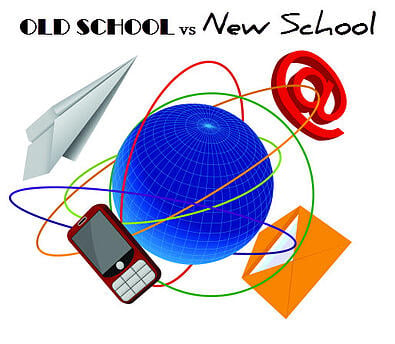
I’m from the old school, the place where you sent a letter of introduction, made a follow-up phone call, scheduled a meeting, and made a sales presentation that hopefully enabled you to close a sale. The new school doesn’t work that way. The new school is about social media, the use of technology, and in-the-know buyers.
In the old school, if the buyer had a need he or she wanted to talk to as many sellers as possible to gather information in order to find the best offering at the best price. Again, the new school is different. The buyer does a Google search, checks out a few corporate Web sites, gathers experiential information from customers on Twitter and Facebook, makes a decision and then contacts the seller, or sellers, the buyer wants to talk to.
Is it really that simple, that black and white? Wait, I just had a thought. What happens if an old school seller is in a new business development mode and is trying to sell to a new school buyer. How about this scenario? A new school seller is in a new business development mode and is trying to sell to an old school buyer.
There are generational differences that impact new business development, that’s for sure. It is also true that many old school buyers have changed and adopted the new ways of thinking and behaving.
The new world sales challenge is who is in control of the new business development process, the buyer or the seller? In the new school world, does the seller wait for the inbound, buyer driven lead, or does the seller do what the old school people did, create their own outbound leads?
If your sales revenue is on target or exceeding expectations, and your sellers are not focusing on new business development stop reading this article. However, if your sales revenue is not on target and not meeting expectation read on, you might learn something useful.
Even though the old school new school generational thing is true, it is still an excuse for failure. That’s right an excuse. Ever hear a seller say this; outbound lead development is too hard, too complicated, and just too difficult to master? How about this comment? It’s not like it was in the old days, times have changed, and buyers are more sophisticated. Or this comment; I just don’t have the time it takes to focus on new business development.
Here is what I recommend. Schedule a staff meeting with the right people and go over the following new business development agenda.
- Is our website where it needs to be when compared to our competitors?
- Do we have a social media presence and who is responsible for maintaining that presence?
- Do we have a user friendly CRM that is used by all of our sellers?
- Do we have a strong value proposition for each of the vertical markets we serve?
- Do our Doer Sellers, Seller Doers, and full-time salespeople have a vertical market driven pre-approach letter that they can email to open doors?
- Do our Doer Sellers, Seller Doers, and full-time salespeople have a new business development follow-up telephone script?
- Do our Doer Sellers, Seller Doers, and full-time salespeople have a data base of prospects they can call on a regular basis?
- Do our Doer Sellers, Seller Doers, and full-time salespeople have a targeted number of weekly sales meetings that they are managed to on a regular basis?
- Do our Doer Sellers, Seller Doers, and full-time salespeople have specific quarterly sales quotas that they must achieve?
- Do we hold mandatory weekly sales pipeline meetings that are designed to emphasize a sales culture rather than a delivery content culture?
It is not the old school new school issues that will hold you back. In reality, it is the negative answers to the above ten questions that will stymie your new business development effort. If you answered yes to all of the questions, I offer my sincere congratulations. You are a role model for the rest of us.
About the Author
Howard Dion is the author of "A Doer Seller's Guide for Being Successful at Sales" which can be found on Amazon. Howard Dion founded Matrix Consulting Group, LLC, in 2001, and spent the last decade collaborating with senior management, professional salespeople, and with both Seller Doers and Doer Sellers to improve their sales effectiveness.
Howard has a broad range of vertical market experience in consumer, industrial, information technology, and professional services; and has worked as a one-on-on sales coach with clients in the United States, Australia, Hong Kong, Shanghai, and Singapore.
Prior to Matrix Consulting Group, LLC, Howard owned two other businesses, sold sales training for a global sales training company, sold technical training in the IT sector, and served as vice president of sales for a financial services firm.
You can find Howard's book here >